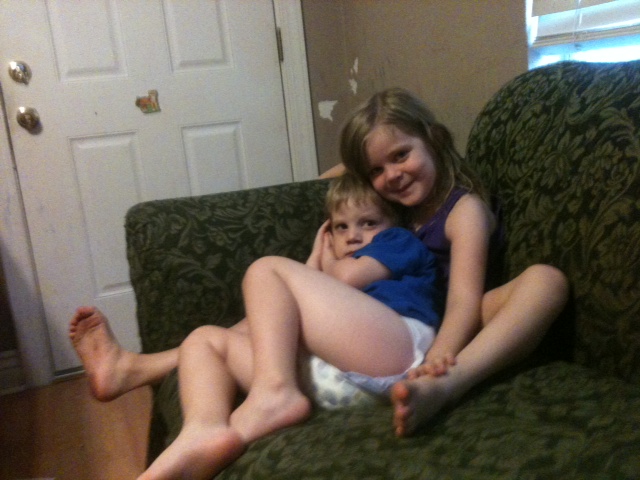 “There’s something happening here. What it is ain’t exactly clear…”
“There’s something happening here. What it is ain’t exactly clear…”
-Buffalo Springfield
Progress is deceptive. When you keep your eyes on the road ahead, the journey seems oh-so-long. Long enough that you perpetually wonder if you’ll ever reach your intended destination. It’s only when you stop going and going and stop to look back that you realize the distance you have already traveled. And, sometimes, that realization is all you need to get a second wind. To find what seems impossible may be in the cards for you after all.
Callum started Pre-K ESE in the spring, right after he turned three. Placing him in that room on the very first day was the scariest thing I’ve ever had to do. Other parents, teachers, and therapists kept telling me that I would be amazed at what the structure of the classroom would do for him in terms of language and social development. I don’t think I really believed them. Not because I don’t have hope for my child. I do. It’s just that hope can sometimes be a dangerous thing. It can let you down. With a severely developmentally delayed child, you have to walk the nearly invisible line between acceptance for what might be and hope for what could be. When you do one, you risk denying your child the other — in an endless cycle of “I need to do better”.
But since returning to school this fall – to the same teacher’s class – we cannot deny that Callum has made progress. On all fronts.
A few weeks ago, we began receiving reports of words from school and daycare. And not just randomly repeated words out of context. But words Callum knows and made the choice to use. “Peesa” (pizza), “mi” (milk), “pees” (please), “I sowwy” (I’m sorry), “tantu” (thank you), “goo ja” (good job), “nana” (banana), “come ah” (come on), and more. It seemed to happen all at once.
But it hasn’t been just words. There’s been a kind of strange give and take in our verbal interactions with him — even when he’s just babbling. His babbling sounds like sentences in a foreign language. And they have a distinct tone — silly, happy, etc. The amusing one is when he is displeased. You can tell you’re in big trouble with that one as he furrows his eyebrows, raises his voice, and emphatically babbles his displeasure. That one inevitably follows being told that he may not have more chocolate or jump on the couch. Or both. The important thing is that he is clearly responding to what we say. He responds when asked a question and usually when told to do something. And it’s often like a conversation. It’s different from before – in some way I can’t exactly qualify. But everyone sees it.
And then there are the social differences. His teacher, whom we think the world of, reports that he is understanding and following classroom routines. He sits in circle time, follows the yellow line when walking, and holds is backpack. No, he isn’t mastering any academic goals yet. But social conformity precedes learning. It’s a foundation on which we can build.
He’s also getting into things more now and starting to get in trouble. It gets harder each day to look dutifully stern when he gets a naughty twinkle in his eye before attempting yet again to break the rules. He knows he’s being bad – and he is delighting in that knowledge.
And when he isn’t looking, so are we.
If I had to boil it down to one description, it would be this: Callum — the boy — is in the room with us more and more, not just his body. He isn’t playing quite yet, but he has shown more interest in some toys. He is requesting things other than food (such as bringing us his shoes when he wants to go for a drive). He is swaying to music on occasion. And discovering that he can open things and make a mess.
Callum, in short, is emerging from behind the wall of autism. Yes, I know the wall will always be there. I know it is a part of him. He will always be different, and he will always slip behind that wall sometimes. But he is learning that things on our side are kind of cool too. He is seeking us out and realizing that we will consistently meet his needs — especially if he makes them known to us.
And with this comes a level of wonder you can’t begin to know unless you have a child whose developmental milestones aren’t guaranteed. Each one met is precious and must be celebrated without the assumption of the next to come. Living in the moment takes on new meaning when patience becomes a choice over a virtue.
No, nothing this little boy does is taken for granted. Every word, every interaction, every anything he didn’t do before becomes a blessing. And that, in itself, is a blessing I could have never anticipated just a few short years ago.
 Yes, we have words. But with that, we have so much more. We have hope. And a song in our hearts — whose tune we have sometimes forgotten.
Yes, we have words. But with that, we have so much more. We have hope. And a song in our hearts — whose tune we have sometimes forgotten.
Morning has broken, like the first morning
Blackbird has spoken, like the first bird
Praise for the singing, praise for the morning
Praise for the springing fresh from the Word
–Eleanor Farjeon
 Progress in developmentally disabled children is a funny thing. A lot like getting fat really — a subject I have enough experience with in which to opine. You don’t see weight gain in terms of ounces. Instead, it steadily creeps up on you. You aren’t sure whether the pants you just put on are really tighter or if they just shrank in the dryer. It could be that you are retaining water, after all. But the ounces keep building up until one day you can actually see it. Loved ones, seeing you every day, may or may not notice. But the nurse at the doctor’s office dutifully records it on her little chart. And that obnoxious co-worker you make it a habit to avoid keeps suggesting you join everyone for Zumba. (Which, in terms of tolerable behavior, is the outside of enough really.)
Progress in developmentally disabled children is a funny thing. A lot like getting fat really — a subject I have enough experience with in which to opine. You don’t see weight gain in terms of ounces. Instead, it steadily creeps up on you. You aren’t sure whether the pants you just put on are really tighter or if they just shrank in the dryer. It could be that you are retaining water, after all. But the ounces keep building up until one day you can actually see it. Loved ones, seeing you every day, may or may not notice. But the nurse at the doctor’s office dutifully records it on her little chart. And that obnoxious co-worker you make it a habit to avoid keeps suggesting you join everyone for Zumba. (Which, in terms of tolerable behavior, is the outside of enough really.)




